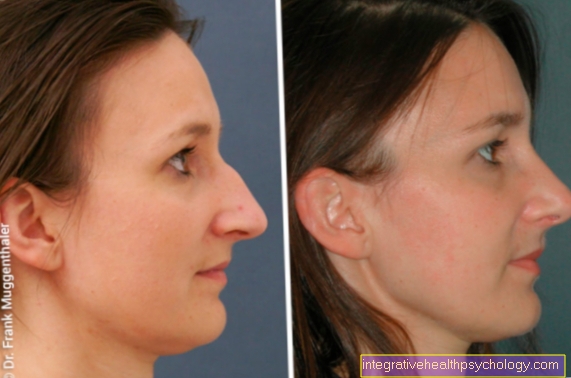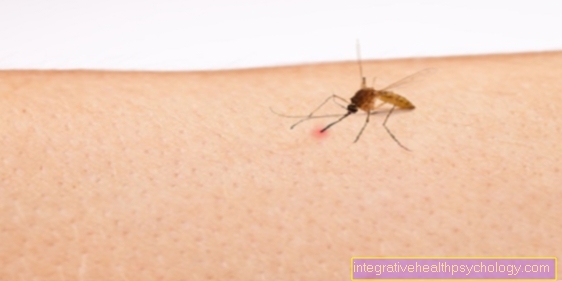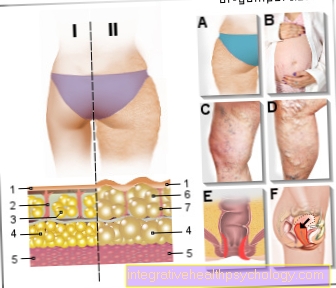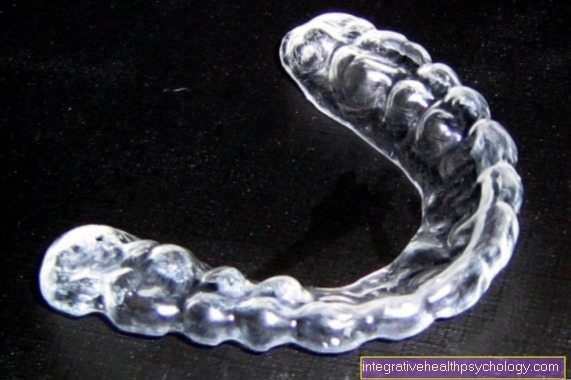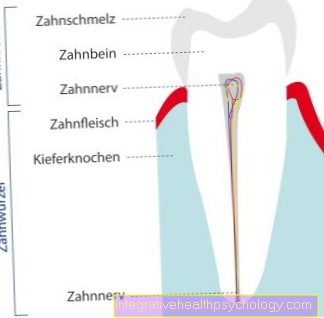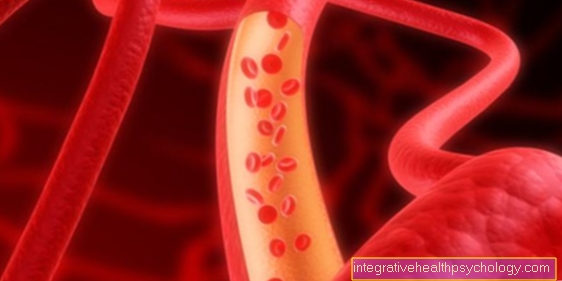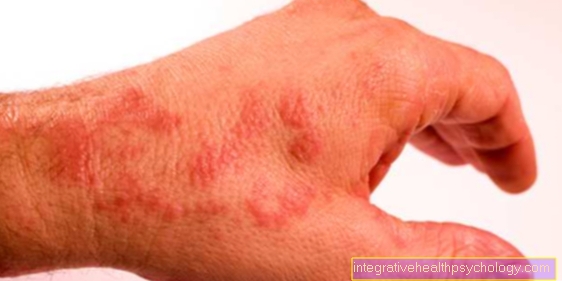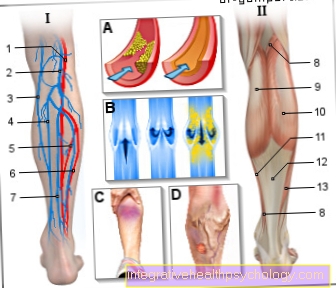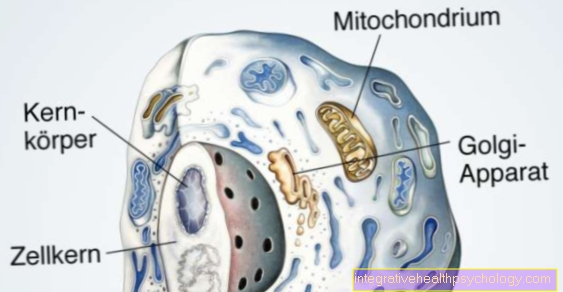Testosterone deficiency
Generally

Testosterone is an important sex hormone that occurs in men and women and has different effects on sexual development and sexual behavior, as well as on muscle building. In men, a sufficient testosterone level ensures sexual development and the onset of puberty. It is also responsible for sperm maturation and the development and maintenance of typical male body hair. It is also discussed which psychological effect testosterone plays in the body.
A testosterone deficiency, also known medically as testosterone deficiency syndrome, can affect a large number of different systems in the body.
Depending on the severity of the deficiency, it can lead to very drastic or less severe symptoms. A distinction must be made here whether the testosterone deficiency occurs at a young age or in old age. The individual symptoms can vary depending on when they occur.
The therapy for testosterone deficiency depends on the cause of the disease. In some cases, the cause of the testosterone deficiency, if known, can be treated. A reduction in the risk factors that can lead to a testosterone deficiency can help prevent this or help normalize testosterone levels. Since testosterone is available as a drug, the prognosis can be assessed as good if it is recognized in good time and when substitution therapy is started.
Symptoms
In general, a distinction must be made between early testosterone deficiency and testosterone deficiency in old age. The latter is usually a common change in older men, but it can also occur in women.
If there is a very early testosterone deficiency, this is usually noticeable at the beginning of puberty. Since testosterone is responsible for the development of the sexual organs, as well as the typical male body hair and most of the other typical symptoms of puberty, this development is disturbed by a prevailing testosterone deficiency.
A testosterone deficiency which sets in in aging people is a common observation in medicine. Similar to the so-called menopause in women, men over 50 sometimes experience a hormone deficiency.This can show itself differently depending on the individual situation and the strength of the testosterone deficiency. Typical changes in a testosterone deficiency are noticeable tiredness, a loss of libido, the loss of zest for life, as well as external symptoms such as a decrease in beard growth or an increase in the percentage of body fat, as well as the possible appearance of psychological symptoms. In addition to sleep disorders, the psychological symptoms also include an increased incidence of depressive illnesses and, in some cases, an enormous lack of concentration. Since testosterone also plays an important role in maintaining the structure and building muscle, cartilage and bone mass, changes in the musculoskeletal system can occur. A reduced ability to build muscles and a reduction in existing muscle mass as well as low bone density (osteoporosis) are typical.
It should be noted that, in spite of a testosterone deficiency, not all symptoms have to appear and additional complaints may be noticed. Young men who did not go through puberty by the age of 15 should have a doctor rule out a testosterone deficiency. Men and women who show unspecific symptoms of a testosterone deficiency should also talk about the symptoms with a treating doctor so that he can check the blood values for a possible testosterone deficiency and, if necessary, initiate therapy.
Testosterone in men / women
Testosterone is a sex hormone found in both men and women. The testosterone level, and therefore the amount of testosterone found in the blood in men however clearly higher. The tasks for which testosterone is responsible in the body are also more numerous in men than in women. Nevertheless, testosterone is necessary for some important processes in a woman's body.
So is the testosterone level with the woman necessary for muscle building, and the stability of the bones. It is also responsible for a woman's libido. Some psychological effects are discussed which testosterone levels should have in women. So can a low level of testosterone in the woman's body presumably as a reason for the occurrence of depression are counted. Since the connective tissue is under the influence of testosterone, a excessive connective tissue weakness may be influenced by a lack of testosterone. The individual symptoms of a testosterone deficiency in women can be very different and sometimes only vaguely perceived. If it is suspected that there is a testosterone deficiency, a doctor can be asked about the underlying symptoms and a blood test can be arranged.
Treat testosterone deficiency
Individual treatment for testosterone deficiency is usually influenced by the underlying cause, if known. Especially that Reduce the possibly present Risk factors for the development of a testosterone deficiency, a normalization of the testosterone level may possibly be achieved. There testosterone also as a drug there is also the option of external testosterone substitution. After a comprehensive diagnosis, a doctor should be able to judge whether such therapy is necessary and how it is best carried out. Sometimes it is possible that certain diseases or situations exist in which a substitution of testosterone is not possible. An example of such a contraindication is cancer of the prostate.
root cause
The causes that cause a testosterone deficiency can be very diverse. Sometimes no cause can be found. It is assumed that a number of the medical backgrounds for the development of testosterone deficiency have not yet been researched.
One condition that is associated with a lack of testosterone is Klinefelter Syndrome. Read more about this at: What is Klinefelter Syndrome?
It is believed that certain risk factors contribute to the development of a relative testosterone deficiency. In particular, obesity, high blood pressure, disorders of the lipid metabolism and the presence of type 2 diabetes mellitus are suspected of being able to trigger such a lack of testosterone. The production of testosterone is largely controlled by the function of the pituitary gland. Diseases of this gland can lead to hormonal disorders and, as part of this, a testosterone deficiency syndrome. However, a testosterone deficiency can also occur as a result of a natural change in hormone levels with age. For example, low testosterone levels are very common in older men and do not always need treatment. We also know that stress and congenital genetic defects can lead to a testosterone deficiency.
therapy

The individual Therapy depends on the severity of the testosterone deficiency as well as the individual root cause which is responsible for the defect is decisive. If known, an attempt should be made to treat the triggering cause. In many cases this can improve the situation. This includes the therapy of obesity, high blood pressure and type 2 diabetes mellitus. The therapy of Lipid metabolism disorders can help raise low testosterone levels. A low testosterone level does not always have to be treated. So it may not be necessary to treat the testosterone deficiency if there is no subjective symptom. In general, the attending physician can get an idea of the situation after recording the complaints and assessing the laboratory values and makes the decision on the necessity of substitution therapy on an individual basis. If therapy is necessary and useful, testosterone can be administered as a drug and the hormone level can be raised.Because some diseases, such as a Prostate cancer, one Treatment with testosterone impossible power, these so-called contraindications should be ruled out before substitution therapy is carried out.
diagnosis
In order to be able to diagnose a testosterone deficiency, the affected person must first consult a doctor. If you notice symptoms that suggest a low testosterone level, you should go to your family doctor or a specialist endocrinology makes sense. This will usually first record the underlying symptoms in order to get an overview of the symptoms. This is followed by one if necessary physical examination which, however, is usually very brief if a testosterone deficiency is suspected. By a Blood draw the blood can be checked for testosterone levels. After a few days, the results will be available and there may be certainty that there is a testosterone deficiency.
How To Detect Testosterone Deficiency
In the majority of cases, a testosterone deficiency is caused by the symptoms triggered by the disease. Since the symptoms of a testosterone deficiency are sometimes very subtle, a deficiency can sometimes go undetected for months or years.
A testosterone deficiency which occurs before or during puberty is usually based on the lack of education for puberty typical external features discovered.
Laboratory chemistry a testosterone deficiency can be caused by a blood sample to be established. The value found in the blood can be compared with normal values and a testosterone deficiency can be diagnosed if the value is low.
Compensate for lack of testosterone
There are different ways to compensate for a testosterone deficiency. It makes sense to try to stimulate the body's own production of testosterone. This can often be achieved with a therapy for the diseases which may be the cause of the testosterone deficiency. Since testosterone is available as a drug, drug administration of testosterone can also raise hormone levels. How often and for how long the therapy has to be carried out depends on the individual laboratory values and the symptoms, which is why both should be checked regularly.
A testosterone deficiency which before puberty may occur by only a few Testosterone doses be balanced. Often attempts are made to stimulate their own testosterone production with an initial substitution therapy.
forecast
The prognosis of a testosterone deficiency can usually be assessed as very good. It is important that a testosterone deficiency is recognized in order to be able to treat it properly. Testosterone deficiency is essentially not a serious condition and is usually easy to treat. However, the individual symptoms can be very limiting and lead to complications if they persist for a long time.
prophylaxis
It makes sense to prevent the occurrence of a testosterone deficiency Risk factors which can trigger a deficiency too eliminate. In addition to preventing obesity, this also includes the therapy of a disturbed lipid metabolism, high blood pressure and type 2 diabetes mellitus. Measures that increase physical activity as well as one healthy eating style are therefore extremely important in the prophylaxis of testosterone deficiency and help prevent the development of risk factors.

